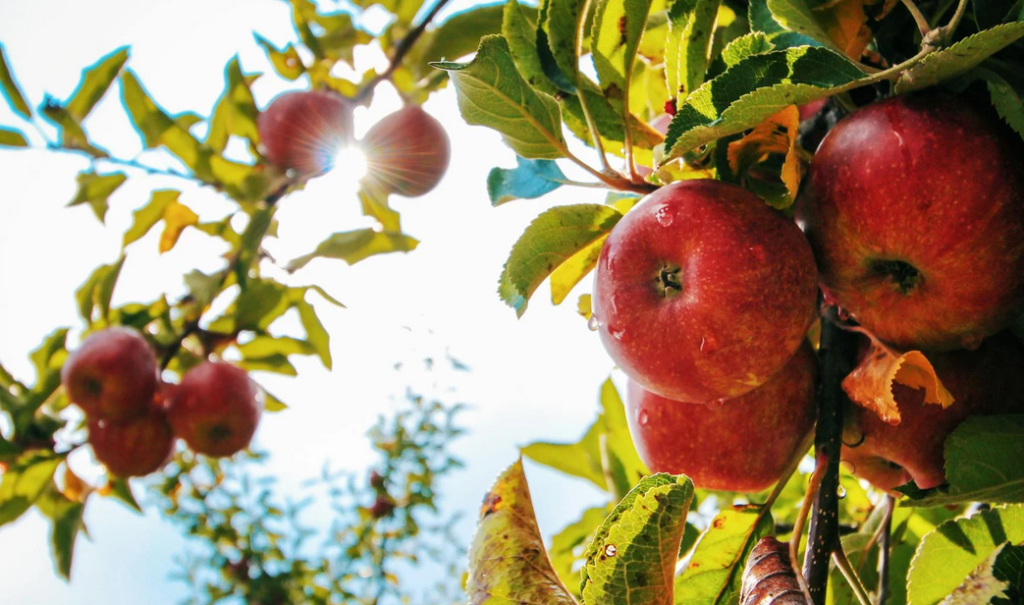With the growing awareness of sustainability in various aspects of our lives, the food industry is no exception. Apple cider vinegar is a pantry staple for many. While usually only the health benefits are discussed, the sustainability and environmental aspects often receive less attention. In this article, we delve into the relationship between apple cider vinegar and sustainability and explore how this tangy elixir contributes to a greener and healthier planet.
The Production Process: A Green Start

Orchard Practices
Apple cider vinegar’s journey begins in the orchards, and so does its sustainability. The sustainable apple farming involved ensures organic cultivation and integrated pest management. These methods prioritize soil health leading to reduced use of synthetic pesticides thereby promoting biodiversity. Thus choosing apple cider vinegar that is made from sustainably grown apples we ensure a minimal ecological footprint right from the start.
Low-Impact Fermentation
The fermentation process is a very important step in the production of apple cider vinegar. The fermentation is often done using low-impact methods, such as small-batch processing and natural fermentation. This has an even better impact on its eco-friendliness. These methods require less energy and result in reduced greenhouse gas emissions compared to large-scale industrial processes.
Packaging: Less Plastic, More Planet-Friendly
Packaging, in general, plays an important role in the sustainability of any product. Sustainability-adhering apple cider vinegar producers are adopting eco-friendly packaging solutions to minimize environmental impact. These choices include glass bottles and recyclable materials. reduce the reliance on single-use plastics. As a result, they contribute to a circular economy.
Waste Reduction: Turning Apples into Zero Waste Heroes

Pomace Utilization
Pomace(the leftover pulp) is a prominent by-product of apple cider vinegar production. It often finds new life as animal feed, compost, or even in the creation of biodegradable materials. This beautiful approach transforms waste into valuable resources thereby aligning with the principles of a circular economy and minimizing the ecological burden.
Composting Opportunities
As for us consumers, the journey towards sustainability continues beyond the kitchen. The discarded apple peels and cores can be composted to create a nutrient-rich soil amendment. This not only reuses the organic waste from landfills but also contributes to the creation of sustainable and homegrown produce.
Local Impact: Supporting Regional Agriculture

When locally produced apple cider vinegar is chosen, it fosters sustainability at a community level. Local sourcing reduces transportation-related carbon emissions. It also supports regional economies and strengthens the connection between consumers and local farmers. A small, but impactful choice if you are looking to align your dietary preferences with environmental responsibility.
Health Benefits and Sustainability

Finally, coming down to it’s health benefits. Apple cider vinegar offers a myriad of health benefits :
- Blood Sugar Control: It may help regulate blood sugar levels, making it beneficial for those with insulin resistance or diabetes[1].
- Weight Management Support: Incorporating apple cider vinegar into your diet may contribute to weight loss by promoting a feeling of fullness[2].
- Heart Health Ally: The acetic acid in apple cider vinegar is linked to potential benefits such as lowering cholesterol and improving cardiovascular function[3].
- Antimicrobial Power: With antimicrobial properties, apple cider vinegar acts as a natural preservative and may combat harmful bacteria according to some studies[4].
- Skin Savior: When applied topically, it can improve skin conditions like acne or eczema due to its antibacterial and anti-inflammatory properties[5].
This dual role as a health booster and a sustainability champion makes it an attractive choice for environmentally conscious consumers.
Conclusion
In conclusion, apple cider vinegar and sustainability are intertwined. The production of apple cider vinegar presents numerous opportunities to contribute positively to the environment. Share your apple cider vinegar story and how you use it in your daily life. Let us and others know about your valuable experience!
What’s more? Learn about Fermented Garlic Honey and how it can boost your health and be a very sustainable snack. Furthermore, discover the benefits of raw kombucha juice and how it can have a positive impact on the environment.





